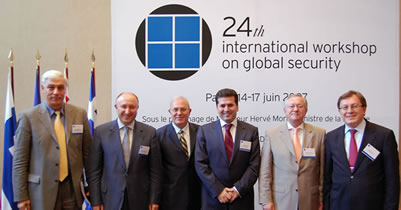Paris '07 Workshop |
Security in Southeastern Europe and the Black Sea Region
 |
Ambassador
Tacan Ildem |
|
| Turkish Ambassador to NATO Tacan Ildem (right) with members of his Black Sea panel (from left to right): Russian Lt. Gen. Evgeniy Buzhinsky, Georgian Foreign Minister Gela Bezhuashvili, Bulgarian Defense Minister Dr. Vesselin Bliznakov, Albanian Defense Minister Fatmir Mediu, and Ukrainian Foreign Minister Borys Tarasyuk. |
The Balkan region is “...an area of critical strategic interest to Western governments and a potential flash point
for further conflicts. The region's problems are complex, deeply rooted, and
unlikely
to be
resolved without sustained attention
and involvement
on the part of the international community."
Today we are going to discuss two regions that face important security challenges.
CHALLENGES IN SOUTHEASTERN EUROPE
The first of these, southeastern Europe, is undergoing major realignment and change as a result of the increasing rate of Euro-Atlantic integration of regional countries. For example, Bulgaria, represented by Minister Bliznakov, has become a member of both the European Union and NATO. While others such as Turkey are proud members of just one of these august organizations for the time being, Albania is now actively seeking membership in NATO.
Recently we witnessed a campaign of ethnic cleansing that may have sowed seeds of enmity that will be harvested in years to come. Three countries directly involved in that unfortunate period have joined the ranks of Partnership for Peace—the decision was made to engage these countries in eventually becoming providers of security rather than consumers of it. The European Union also seems to be on this path.
Now we face the issue of Kosovo, which concerns the entire international community. Each Balkan land also faces political, economic, and ethnic challenges as it seeks to vault from times past to the 21st century. All countries in the region must carry out painful reforms to qualify for EU membership by establishing democratic institutions, ensuring the rule of law, and promoting tolerance. They must also carry out defense and security sector reforms to either become members of NATO or to further their relationship with the Alliance.
Essentially, the Balkans have never really been synonymous with projecting stability. Indeed, the International Crisis Group has described the region as “remaining an area of critical strategic interest to Western governments and a potential flash point for further conflicts. The region's problems are complex, deeply rooted, and unlikely to be resolved without sustained attention and involvement on the part of the international community.
CHALLENGES IN THE BLACK SEA REGION
The second region to be discussed today is the Black Sea region. This is an area that is growing in importance because of the intricate balances in the Caucasus, the wealth of natural resources that are being tapped and transferred to varied markets, and the numerous frozen conflicts that await resolution. Georgia and Ukraine are well on their way to integrating with Euro-Atlantic institutions, while new issues such as missile defense and those related to CFE have the potential to cast greater shadows over regional security and stability. The numerous initiatives that are ongoing in the region, such as GUAM and BSEC, were all launched with good intentions. However, one wonders if they are sufficient to complement the efforts of others such as the OSCE to make the region a bastion of stability and therefore enable economic growth.
CONCLUDING REMARKS
As members of the international community, we are all committed to the territorial integrity of countries that are hosts to frozen conflicts. Moldova and Georgia are such hosts, experiencing persistent conflicts that have negative collateral consequences beyond their borders. The Transdinyester conflict is related to the CFE issue of Istanbul commitments whereas the conflicts in Abkhazia and South Ossetia are not helpful to Georgia-Russia relations. The international community shares the view that these conflicts need to be resolved through peaceful means. A number of welcome plans, such as President Saakashvili’s Peace Plan for South Ossetia, have been developed to serve as a basis for negotiations and settlement. I believe that it is our collective belief that restraint and reason should be employed to prevent further escalation of the conflicts and that constructive dialogue provides the only avenue for peaceful resolution of disputes.
